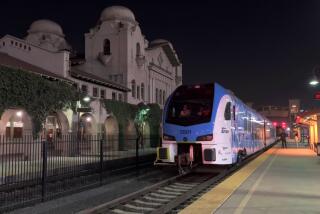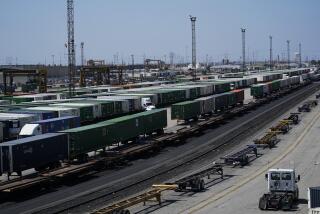Builder of 1st phase of California’s bullet train faces scrutiny
The state bullet train agency is pushing full throttle to start construction of the important first phase of the California high-speed rail system in as little as six weeks, prompting scrutiny of the state’s selection of a construction company with the worst technical scores among bidders.
Tutor Perini Corp. won the competition to build the first 29 miles of the high-speed rail route on a low bid of $985 million, even though its design quality, safety plan and engineering, among other factors, ranked at the bottom of five teams seeking the work.
The highest-scoring team, led by the Spanish firm Ferrovial, bid $1.4 billion. The second-highest scorer, led by the Spanish firm Dragados, bid about $100 million more than Tutor.
A state Senate committee, a subcommittee of the U.S. House of Representatives and the state auditor, among others, are looking at a variety of issues and allegations about the project, even as the state begins buying the first parcels of land ahead of the planned start of construction in July.
The House subcommittee on rail, chaired by Rep. Jeff Denham (R-Atwater), a bullet train critic, is expected to demand a detailed explanation of how the selection was made when he opens a hearing Tuesday in the San Joaquin Valley city of Madera, near where Tutor Perini would first sink its shovels into the ground.
“My biggest concern,” Denham said, “is that somebody could come in low and we would see wild change orders and wild price increases and the contractor would make money on the back end.”
Denham said the project was “out of control” and was putting the state at risk of squandering billions of dollars on a system that could be abandoned partially built. He added that no construction should occur until legal disputes are settled, required environmental reviews are completed, and voters are given a chance to approve the growing cost of the $68-billion project.
Rail authority Chairman Dan Richard says that the project has made tremendous progress this year and that Tutor’s price will save the state money.
The initial 29-mile stretch would run south from near Madera toward Fresno, reshaping the state’s fifth-largest city with a 1.7-mile trench, a 1.2-mile viaduct and three major bridges.
The construction includes building a long tunnel in a pit and then pushing it into place with giant hydraulic jacks, a technically complex job that has seldom been done in the United States.
The federally funded portions of the project must be completed by 2017 to avoid potentially forfeiting grants, which would add to the project’s problems with long-term financing. Of the $68 billion, the Government Accountability Office, an arm of Congress, has estimated the project is short more than $38 billion.
Tutor Perini and its team, which includes Pasadena-based engineering firm Parsons Corp., will also do most of the design and engineering work.
Tutor Perini may have won the bid because of an unusual move by the state, which weighted 70% of its decision on cost and 30% on technical merit. The Design Build Institute of America recommends that government agencies put most of the emphasis on technical scores.
The state also tilted the competition for the low bidder last August when it changed an original plan that would have disqualified the two bidders with the lowest scores from getting the contract.
The authority made low prices a top priority, even offering Chief Executive Jeff Morales a $25,000 bonus when he was hired if he could bring in the bids at or below estimates, among nine other criteria. Rail authority officials say payment of the bonus will be decided by the board in the future.
Before Tutor Perini was selected some financial analysts predicted that it would win the competition only because of its chief executive’s close ties to organized labor, one of the project’s biggest supporters.
The board of the California High-Speed Rail Authority is expected to award Tutor Perini the contract when it meets next month based on a recently issued recommendation from its staff.
The state has said little about why it scored Tutor Perini’s proposals significantly below the two Spanish firms, which have extensive bullet-train experience in Europe.
In addition to Denham, several groups critical of the rail agency said the state was buying down to the least qualified company, an allegation that infuriates Tutor Perini Chief Executive Ron Tutor, who insists that he has far greater expertise than his competitors.
“It is the usual nonsense of people who have no idea how construction functions,” he said in an interview. “There is no buying down anything. The fact that they scored the points only meant in their consultant’s eyes rightly or wrongly — we could debate that forever — they liked the design better from the Spanish.
“What I was told off the record was that certain individuals were enamored of their high-speed rail experience in Europe,” he said. “My response is that technically that has nothing to do with it.”
If his company had low scores, then the scoring system was the problem, Tutor suggested. “Frankly, who ever scored it gave too much credence to the experience building high-speed rail in Europe.”
His team is “light years” ahead of the Spanish in construction competence, he argued. He’s never built high-speed rail structures, he acknowledged, but said the initial construction work is akin to a routine highway project.
Installation of more technically specialized track, signals and electrical systems will be the responsibility of later contractors, he said.
Tutor cited his long record on major California construction projects, including another giant contract award last month for subway stations in San Francisco, and said he took extra care in preparing his team’s bullet train bid.
“That estimate, every dollar in it, I reviewed or judged or made the final call on,” he said.
Tutor has won accolades for performing well on such projects as the Los Angeles Police Department headquarters, the Alamitos Corridor rail link, and elsewhere. But he became embroiled in lawsuits with the L.A. County Metropolitan Transportation Agency over construction issues on the Red Line subway in Los Angeles and with UCLA over delays in construction of the Ronald Reagan UCLA Medical Center.
He said critics’ claim that he bids projects low and then pushes up costs with change orders is inaccurate and undeserved. “It is the biggest drivel that ever took a breath,” he said. “We worked for the city of Los Angeles for 50 years. We have never had a claim. No one else can say that.”
Another action has added to critics’ concerns: The state reduced warranty requirements on completed work from an option for seven years to two years after insurers balked at writing such policies. Tutor said that shouldn’t be a worry because the bridges and tunnels he builds will last for more than a century.
The only “issue,” he said, involves possible future settlement of track bed in some locations. He described an elaborate design fix that will involve injecting concrete and lime under structures.
“We think we dealt with it,” he said.
More to Read
Sign up for Essential California
The most important California stories and recommendations in your inbox every morning.
You may occasionally receive promotional content from the Los Angeles Times.











